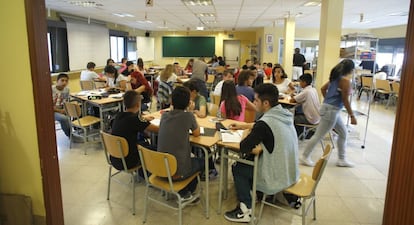Three years on, Spanish science, reading and maths levels hold steady
For first time, Spain hits average OECD levels but experts stress teacher quality needs improving
If Spain were a school student, it would have spent the last 15 years getting pretty much the same marks. That is the finding of the latest OECD PISA global education survey. The report based on 2015 data shows that on a scale where 500 points is average, Spain achieved a score of 493 for sciences (down 3 points on the 2012 result) and 486 for mathematics (up 2 points). For reading, the score is 496 points (up 8 points).

For the first time, Spain has managed to equal the average result of Organization for Economic Cooperation and Development member states, many of whose results have fallen.
A total of 37,000 15-year-old students at 980 Spanish educational centers took part in the study, with Spain’s regions all providing their own data for the first time. Results show a significant north-south divide with Castilla y León scoring 519 points for sciences while Andalusia scored 473 points.
At the national level, the latest PISA exam, which this time had a strong science focus, showed that Spain is in the same bracket as countries such as the US, France, Russia, Norway and Sweden. However, it is long way behind nations like Singapore, which topped the table with 556 points.
The quality of education will never be better than the quality of teachers Montserrat Gomendio, OECD
Estonia and Finland were the highest-ranked European nations, in third and fifth place respectively.
Spain’s Education Minister Íñigo Méndez de Vigo welcomed the results, calling them “very satisfactory.” He said Spain had “bucked the educational trend and now ranked, for the first time in its history, alongside the most advanced countries in the world.”
“The teachers deserve the credit. The ministry counts on to help Spain improve,” said the minister.
Progress “has been positive but movement is still slow,” said the OECD Deputy Director of Education and Skills, Montserrat Gomendio, while the organization’s head of the Directorate of Education and Skills said: “The quality of education will never be better than the quality of teachers.”
Since the OECD began conducting its PISA studies, Spain has rolled out three different education reforms, while the country has also experienced a serious economic crisis with cuts to the education sector of €7.3 billion in six years. Current total spending is €46 billion. However, the results of Spanish students have changed little as a result.
Spain's PISA results have changed little despite huge cuts to education spending
Experts differ when it comes to the value of the results of studies like PISA’s noting it is very difficult to make comparisons between different countries and even between different schools. Key variables include the educational level of parents and the number of students repeating a year.
Spain’s Education Ministry blamed the country’s poor results in the previous PISA study, which was carried out in 2012, on the number of students repeating. On this occasion, the number was lower but still close to one in three students and far below the OECD average of 11%.
One thing experts do agree on, however, is the importance an issue Spain has never addressed: improving the quality of teaching. All of top performing countries – Singapore, Japan, Korea and Taipei (in Taiwan) have far more complex teacher training and development systems, as does Finland.
Spain’s political parties agree on the need to tackle the problem: a debate on the issue was begun in 2009, with some critics saying Spain should develop a professional model for teachers along the lines of those applied to doctors. This debate has stalled but with a new legislature and a new drive in Congress towards a pact on education, this could change.
Spain’s Education Minister Íñigo Méndez de Vigo welcomed the results, calling them “very satisfactory”
In the wake of the latest PISA results, there have been renewed calls for the need for Spanish school students to sit externally assessed exams, something that Gomendio, who was second in charge under former education minister José Ignacio Wert when the ministry draw up plans for its controversial révalidas, or final examinations.
Under the proposed changes students would have had to sit two externally assessed exams. But Spanish Prime Ministry Mariano Rajoy put the plans on the backburner after widespread protests, saying he would seek agreement with other political parties before putting the program in place.
In Spain there is consensus about the need for student evaluation but critics say the new plans would leave students who fail the exams without a valid school leaving certificate.
English version by George Mills.
Tu suscripción se está usando en otro dispositivo
¿Quieres añadir otro usuario a tu suscripción?
Si continúas leyendo en este dispositivo, no se podrá leer en el otro.
FlechaTu suscripción se está usando en otro dispositivo y solo puedes acceder a EL PAÍS desde un dispositivo a la vez.
Si quieres compartir tu cuenta, cambia tu suscripción a la modalidad Premium, así podrás añadir otro usuario. Cada uno accederá con su propia cuenta de email, lo que os permitirá personalizar vuestra experiencia en EL PAÍS.
¿Tienes una suscripción de empresa? Accede aquí para contratar más cuentas.
En el caso de no saber quién está usando tu cuenta, te recomendamos cambiar tu contraseña aquí.
Si decides continuar compartiendo tu cuenta, este mensaje se mostrará en tu dispositivo y en el de la otra persona que está usando tu cuenta de forma indefinida, afectando a tu experiencia de lectura. Puedes consultar aquí los términos y condiciones de la suscripción digital.









































